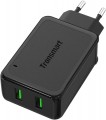USB A ports
The number of USB connectors in the design of the device. We emphasize that here we are talking only about classic, full-size connectors — the so-called USB A; the number of USB-C ports, if any, is specified separately (see below).
The number of USB ports (of any type) corresponds to the number of gadgets that can be simultaneously connected to the charger using adapter cables or plugs for the appropriate connector. Note that not all chargers are capable of delivering full power to all charging outputs at once; see "Charge current" for details. As for the specific number of ports (USB A and/or USB-C), nowadays, relatively simple chargers for
1 port or
2 ports are the most popular. This is due to the fact that separate chargers are usually purchased for one or two specific gadgets, and a larger number of charging outputs is required relatively rarely. However, on the market you can easily find models with
3 ports or
4 ports ; and the most “multi-charged” modern devices have
5 or
6 USB ports or even more.
Charge current
The maximum current that the device is capable of delivering to the charging output. This is one of the key parameters for any charger, it directly determines its power and, accordingly, its efficiency with certain batteries. These points are described in detail in the “Power” paragraph below, but here we note that if several values are indicated in this paragraph, it means that the design provides for several connectors with different current specs (or several groups of connectors, each with its own amount of amperes per port) .
As for specific numbers, when charging from USB (used in most modern chargers), the maximum current up to
1 A is considered very limited,
1.5 A is low,
2 A,
2.1 A and
2.4 A are average values, and in the most powerful chargers, this figure can be
3 A,
3.4 A and even
5 A.Power (for all ports)
The total power provided by the device while simultaneously charging the maximum possible number of gadgets. This parameter is indicated only for models that can work with several gadgets; for a 1-socket charger or a wireless platform, the operating power is given in the “Power per 1 device” paragraph.
When evaluating this parameter, two points should be taken into account. First, when the charger is fully loaded, the power of each individual port and/or wireless platform may be lower than the maximum possible value. For example, some models with 2 USB ports for 2 A and 1 A (10 W and 5 W), with simultaneous operation of both ports, can output only 5 W each, that is, only 10 W in total (this is the number and indicated in this paragraph). Secondly, the distribution of power over individual connectors can be different — depending on the current on each port and supported fast charging technologies; these nuances are best specified in the official documentation.

